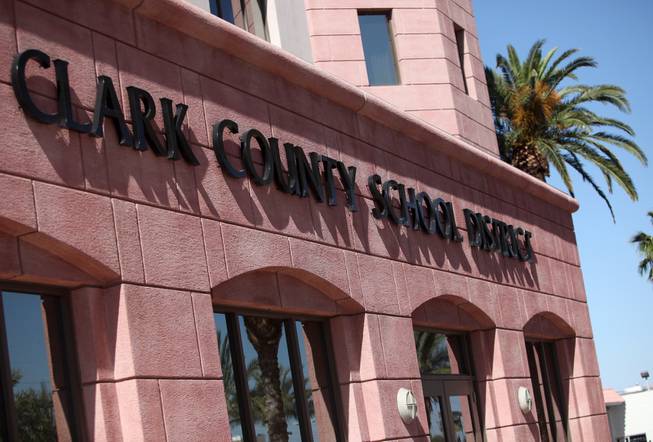
Sun File Photo
The exterior of the Clark County School District’s headquarters in Las Vegas.
Friday, July 8, 2022 | 1:13 p.m.
The Nevada State Board of Education is backing away from a state takeover of the Clark County School District, at least for now.
Receivership, the state said, isn’t actually what it wants.
The state board started knuckling down in late 2021 to find a way to force CCSD to comply with a reorganization law that is supposed to put more power in individual schools. At worst, the state could have appointed a third-party receiver to override decisions by the CCSD School Board and Superintendent Jesus Jara related to decentralization. But Thursday, when the state board could have adopted a regulation explicitly allowing this, members took the sharpest teeth out of the new rule and agreed instead to allow for less-severe “monitoring.”
“I don't think anyone is in favor of or trying to get to receivership,” said board president Felicia Ortiz. “But we do want to get this resolved so that we can get back to our work and focus on student outcomes for the entire state and not just CCSD.”
Board member Mark Newburn, a leading voice for receivership, said his thinking changed after meeting with CCSD School Board members on reorganization compliance in May. He said administrators are struggling to solve issues and it seems that the School Board wants to work with the state on solutions – but that it also saw receivership as a power grab and the state’s real goal.
“I think at this point, the threat of receivership will not encourage the district; it will be a barrier,” Newburn said. “We wanted to get their attention. I think it has, but I want the focus on resolving compliance issues, and I think the (district’s) focus will just be on receivership because they believe that that is the real intent. I don't think they truly understand how we absolutely do not want to be in charge of their district.”
Newburn said the state will work closely with central administrators and campus-level officials. He said dropping the receivership possibility was a “goodwill gesture.”
The regulation that the state board did end up passing Thursday allows the state to issue CCSD a notice of noncompliance and a corrective action plan, and appoint a compliance monitor to guide the district but not take away any decision-making authority. CCSD would be subject to progress reports and a hearing before the state over a six-month monitoring phase.
In 2015, the Nevada Legislature passed a law giving CCSD principals more control over schools and budgets. State lawmakers followed up in 2017 with the more detailed Assembly Bill 469, which cemented how CCSD would institute the power shift starting with the 2017-18 school year.
Under the now 5-year-old law, principals have sweeping authority to select teachers and most other school staff, balance their sites' budgets, and procure most equipment, services and supplies.
Some school leaders say the district never relinquished all the control it is supposed to. The state board has become increasingly pointed in its criticism and impatience, characterizing CCSD as a brazen scofflaw. And top district officials have bristled at this, insisting that they are substantially following the sweeping law and continuing toward full compliance despite the challenges of the coronavirus pandemic.
AB469 includes a broad provision that the state superintendent of instruction can “take such steps that are deemed necessary and appropriate,” which the state used as justification for a consequence as severe as receivership.
So, potentially, the state could specifically revisit takeover.
Newburn hinted at that when he said a state-district collaboration would probably have a better outcome if the thought of receivership isn’t looming in the background, “at least in the short term.”
Board member Tim Hughes added that there was no harm in pulling out the receivership clause now because the state can bring it back later.
Newburn dryly said, though, that he didn’t want the word “receivership” anywhere in the new regulations.
“It will feed the conspiracy that we are somehow after the trustee jobs – because we desire to sit through those toxic meetings, I don't know,” he said.
